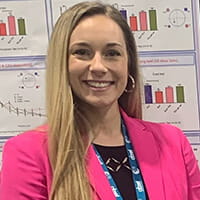Council on Lifestyle and Cardiometabolic Health Early Career Development
The Council's Early Career Development program encourages and assists promising students, post-doctoral fellows and junior faculty as they seek to establish successful careers in science. At the core of these efforts is the Early Career Committee, which serves as an advocate for young investigators. Through direct interaction with the Council leadership, the committee works to ensure networking opportunities, career development symposia and service opportunities that fit the needs of the early career AHA members.
Interested in becoming a member of the Lifestyle Early Career Committee?
Early Career Committee
Chair
 Katherine Collins, PhD
Katherine Collins, PhD
Medical Instructor
Duke University School of Medicine
Chair Elect
 Brittany Pate, BS, PhD
Brittany Pate, BS, PhD
Postdoctoral Fellow
Emory University
Immediate Past Chair
 Leanna Ross, PhD
Leanna Ross, PhD
Assistant Professor in Medicine
Duke University School of Medicine
Members
 Tara Allen, MD, MSc
Tara Allen, MD, MSc
Fellow, Cardiovascular Epidemiology
UCSD
 Romit Bhattacharya, MD
Romit Bhattacharya, MD
Massachusetts General Hospital
 Shawna Follis, PhD, MS
Shawna Follis, PhD, MS
Instructor K99 Fellow
Stanford Medicine

Danielle Crookes, DPH, MPH
Assistant Professor
Northeastern University
 Melissa Jones, MS, PhD
Melissa Jones, MS, PhD
Oakland University
 Simon Higgins, PhD
Simon Higgins, PhD
Postdoctoral Research Associate
University of North Carolina
 Jacob Kariuki, PhD, ANP
Jacob Kariuki, PhD, ANP
Associate Professor
Emory University
 Steven Nguyen, MPH, PhD
Steven Nguyen, MPH, PhD
T32 Aging postdoc
UC San Diego HWSPH
Early Career Events

EPI|Lifestyle 2026
Lifestyle Early Career Lunchtime Session
Wednesday, March 21, 2025, noon–1:30 p.m.
Topic: Three Minute Thesis Competition (3MT™) (PDF)
Listen to five selected graduate students present a compelling oration on their thesis or dissertation topic in three minutes or less. A panel of Lifestyle Council volunteer leaders will determine the best presentation after questioning each competitor and award the most compelling oration the grand prize, courtesy of the Lifestyle Early Career Committee.
Lifestyle ABM Networking Luncheon and Early Career Session
Wednesday, March 21, 2025, noon–1:30 p.m.
Topic: Keeping the Balance: Avoiding Burnout and Managing Time Demands in Academia
The Lifestyle and Cardiometabolic Health Annual Business Meeting and Networking Luncheon is great opportunity to get caught up on activities related to the Lifestyle Council’s significant mission, and to meet some key leaders in the council. Following the luncheon, the Lifestyle Early Career Committee is pleased to host a special session entitled "Keeping the Balance: Avoiding Burnout and Managing Time Demands in Academia.”
Open to all attendees, this session will focus on best strategies to manage challenging time demands while avoiding burnout in the academic environment - a topic of critical importance for a successful career in CVD research. Panelists will include successful junior, mid, and senior-level faculty who will share their experiences with and successful strategies for maintaining work-life balance while successfully furthering their careers.
Moderator: Christopher Imes, PhD, RN, Assistant Professor, School of Nursing, University of Pittsburgh.
Panelists:
- Ryan Demmer, PhD, MPH, FAHA, Associate Professor, Division of Epidemiology and Community Health School of Public, University of Minnesota
- Mercedes Carnethon, Ph.D., FAHA, Associate Professor and Vice Chair, Department of Preventive Medicine, Feinberg School of Medicine, Northwestern University
- Bethany Baron Gibbs, PhD FAHA, Assistant professor, University of Pittsburgh
- Anderson, Cheryl, PhD, MPH, MS, FAHA , Associate Professor and Interim Chair, Preventive Medicine, UC San Diego School of Medicine
Awards
Young Investigator Awards
The Young Investigator Awards recognize outstanding endeavors by new investigators in research activities and encourages continued biomedical research careers, related to cardiovascular function and diseases, including basic science, integrated physiology and clinical problems.
Student Scholarships
The objective of Student Scholar awards is to stimulate student scholars in medicine, nursing, public health, nutrition and other allied health disciplines to carry out research projects related to cardiovascular disease, stroke and basic science.
Career Skills
Presentations
- Adherence to Lifestyle Guidelines: Barriers to Reaching 2020 Goals? (PPT) by Lora E. Burke, PhD, MPH, FAHA, FAAN
- Climbing the Academic Ladder (PPT) by Judith K. Ockene, PhD, MEd, MA
- Starting a Career Studying Social Determinants of CVH (PDF) by Latha Palaniappan, MD, MS, FAHA, FACP, FACE
- Starting a Career Studying Genetic Epidemiology (PDF) by Christopher J. O’Donnell MD MPH
- Starting a Career Studying Prevention in the Clinical Setting (PDF) by Nehal N. Mehta, MD MSCE FAHA
- Starting a Research Career in the Field of Diabetes (PDF) by Sherita Hill Golden, MD, MHS
- Transforming Healthcare Delivery Through Cardiovascular Registries (PDF) by Eric D. Peterson, MD, MPH and Fred Cobb, MD, Professor of Medicine
- Successful Early Career Research Using Get With The Guidelines (PDF) by Gregg C. Fonarow, MD
- Role of Health IT in Effective Cardiovascular Care Delivery and Research (PDF) by Frederic S. Resnic, MD, MSc
- Media Training- EPI-NPAM (PPT) by American Heart Association (AHA)
Educational Opportunities
Meetings and Conferences
Seminars
Funding Opportunities
Searching for Funding Opportunities
- Search for funding opportunities from the American Heart Association
- Search and subscribe to the NIH Guide for Funding Opportunities and Notices
- Search for grant opportunities in all federal agencies
- Register at Pivot (previously known as Community of Science (COS)): for targeted weekly emails of funding opportunities or search their database (federal and non-federal)
Types of Grants
- Pilot Funds include NIH R03 or small grants ($50k year)
- NIH K awards – 2-5 years in length, large portion is PI salary with small research budget
- NIH R01’s Investigator initiated awards – can be in response to PA’s— (up to $500K year, up to 5 years)
- Responses to RFA’s
- Other independent funding
Please visit the AHA's Research Funding Opportunities for more information about the following Grants and Awards.
- Medical Student Research Program
The student research program encourages promising students, including women and members of minority groups underrepresented in the sciences, from all disciplines to consider research careers while supporting the highest quality scientific investigation broadly related to cardiovascular disease and stroke. The research opportunity will allow students to work for 8, 10 or 12 weeks with a faculty/staff member on any project broadly related to cardiovascular disease/function or stroke. The goal is to encourage students to consider a future academic career in this area.
- Predoctoral Fellowship
Helps students initiate careers in cardiovascular and stroke research by providing research assistance and training.
- Clinical Research Program
Encourages early career investigators who have appropriate and supportive mentoring relationships to engage in high quality introductory and pilot clinical studies that will guide future strategies for reducing cardiovascular disease and stroke while fostering new research in clinical and translational science, and encouraging community- and population-based activities.
- Undergraduate Student Research Program
The purpose of this undergraduate research training program is to encourage promising students from all disciplines, including women and members of minority groups underrepresented in the sciences, to consider research careers while supporting the highest quality scientific investigation broadly related to cardiovascular disease and stroke.
- Fellow-to-Faculty Transition Award
Provides funding for trainees with outstanding potential for careers as physician-scientists in cardiovascular or stroke research during the crucial period of career development that spans the completion of research training through the early years of the first faculty/staff position. The award provides a supportive mentored experience during this period of transition. The award will
- greatly enhance the awardee's chances of obtaining a high-quality faculty/staff appointment;
- improve the awardee's success and retention in an investigative career in cardiovascular science; and
- develop the mentoring skills of the awardee as a potential future mentor.
- Postdoctoral Fellowship
Helps trainees initiate careers in cardiovascular and stroke research while obtaining significant research results under the supervision of a sponsor or mentor; supports individuals before they are ready for some stage of independent research.
- Beginning Grant-In-Aid
Promotes the independent status of promising beginning scientists.
- Scientist Development Grant
Supports highly promising beginning scientists in their progress toward independence by encouraging and adequately funding research projects that can bridge the gap between completion of research training and readiness for successful competition as an independent investigator.
- Grant-In-Aid
Encourages and adequately funds the most innovative and meritorious research projects from independent investigators.
Basic Science Track
Predoctoral Training Grants
- NIH: Ruth L. Kirschstein National Research Service Awards for Individual Predoctoral Fellows (Parent F31)
- NIH: Ruth L. Kirschstein National Research Service Awards for Individual Predoctoral Fellowships to Promote Diversity in Health-Related Research (Parent F31 - Diversity)
- AHA: Predoctoral Fellowship
Postdoctoral Training Grants
- NIH: Ruth L. Kirschstein National Research Service Awards (NRSA) for Individual Postdoctoral Fellows (Parent F32)
- NIH: Pathway to Independence Award (Parent K99/R00)
- AHA: Postdoctoral Fellowship
Early Career/Transition Grants
- NIH: Mentored Research Scientist Development Award (Parent K01)
- NIH: Independent Scientist Award (Parent K02)
- AHA: Career Development Award
Clinical Science Track
Predoctoral Training Grants
- NIH: Ruth L. Kirschstein National Research Service Awards for Individual Predoctoral MD/PhD and Other Dual Doctoral Degree Fellows (Parent F30)
- NIH: NHLBI Ruth L. Kirschstein National Research Service Awards for Individual Predoctoral MD/PhD Fellows (F30)
- AHA: Predoctoral Fellowship
Postdoctoral Training Grants
- NIH: Ruth L. Kirschstein National Research Service Awards (NRSA) for Individual Postdoctoral Fellows (Parent F32)
- NIH: Pathway to Independence Award (Parent K99/R00)
- AHA: Postdoctoral Fellowship
Early Career/Transition Grants
- NIH: Mentored Clinical Scientist Research Career Development Award (Parent K08)
- NIH: Mentored Patient-Oriented Research Career Development Award (Parent K23)
- NIH: Independent Scientist Award (Parent K02)
- AHA: Career Development Award
Science Social Media
X
- AHA Science
- ATVB
- Circulation
- Circulation: Arrhythmia and Electrophysiology
- Circulation: Cardiovascular Imaging
- Circulation: Cardiovascular Interventions
- Circulation: Cardiovascular Quality and Outcomes
- Circulation: Genomic and Precision Medicine
- Circulation: Heart Failure
- Circulation Research
- Hypertension
- JAHA
- Stroke